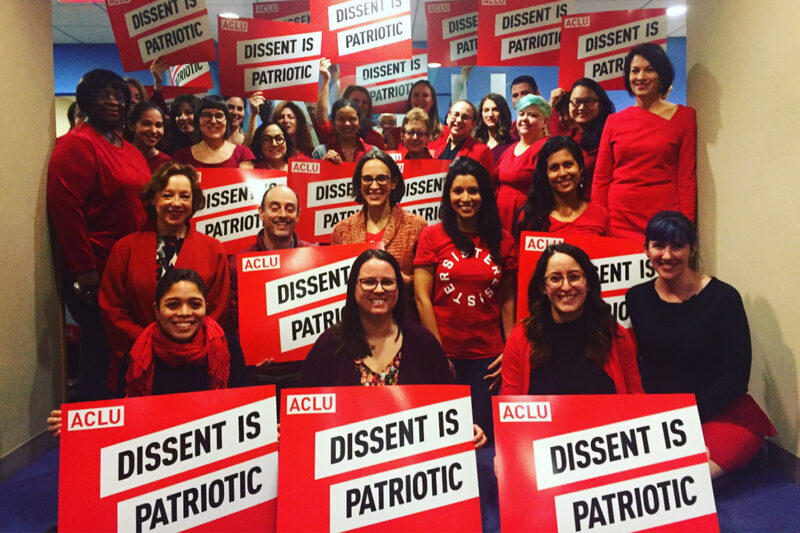On International Women’s Day, Here’s How the ACLU Is Fighting for Women’s Rights in the Face of the Most Anti-Woman Agenda in History


Today, as women across the world celebrate International Women’s Day, many here in the U.S. will be participating in “A Day Without a Woman,” a follow-on to the Women’s March on inauguration weekend that drew millions to rally in Washington, D.C., as well as in cities around the country and around the world. For many of us who work every day in the trenches to secure women’s rights, the march was profoundly energizing — a powerful demonstration of the renewed momentum in the struggle for women’s equality and its increasingly intersectional focus.
A Day Without a Woman gives us another concrete way to make our strength visible: Organizers are encouraging participants to take the day off work, avoid shopping (with exceptions for women- and minority-owned small businesses), and/or wear red to demonstrate solidarity. This demonstration of strength is critical because the Trump administration poses an unprecedented threat to women’s equality and well-being. Defeating it is going to take all of our strength and persistence.
Well, here at the ACLU, we know a little something about persistence. The ACLU has been on the front lines in the struggle for women’s equality since the Women’s Rights Project was co-founded by Ruth Bader Ginsburg in 1972. While the progress we’ve made is undeniable, we’re still fighting some of the same battles today we fought back then in three priority areas: employment, education, and ending violence against women. And our colleagues in the Reproductive Freedom Project continue their tireless fight to protect the right to contraception, the right to abortion, and the right to bear a child.
We’re not going to stop now. On the contrary, we’re prepared to do everything in our power to fight back on behalf of all women — relentlessly. Here are a few of our plans on how to hold the line against Trump’s anti-woman agenda:
- Protecting the rights of survivors of domestic violence and sexual assault. The federal government has played an important role in advancing the rights of survivors of domestic violence and sexual assault in education, housing, employment, and access to law enforcement and government services. We will continue to protect these rights even if the Trump administration ignores or attempts to trample on them.
- Fighting the rollback of critical civil rights protections for women, people of color, and LGBTQ individuals. The Trump administration has already moved swiftly to repeal guidance that helped ensure equal treatment for transgender students in school. This cruel move is likely a harbinger of things to come. Other critical educational protections at risk include guidance on pregnant and parenting students and students with disabilities as well as guidance on school discipline. We will continue our efforts to ensure that all laws banning sex, race, and other discrimination in housing, employment, and education are robustly enforced by the courts as well as federal agencies.
- Combating executive actions that would erode women’s equality in the name of religious freedom. A religious freedom executive order that Trump was on the verge of signing would have authorized discrimination against women, particularly unmarried pregnant women; LGBT people; members of minority faiths; and people seeking reproductive health care based on religious beliefs. Although Trump did not sign it last month, rumors are circulating that another version might be in the works. Last week the ACLU filed Freedom of Information Act requests to gain access to documents related to the executive order, and we are prepared to use every weapon at our disposal, including litigation if necessary, to prevent the use of religion to discriminate against others.
- Opposing repeal of the Affordable Care Act. Repeal would cause up to 32 million people to lose health insurance coverage, strip women of critical maternity and newborn care, preventative screenings, and contraceptive coverage; remove antidiscrimination protections for LGBT people and risk bringing back sex discriminatory insurance pricing, including charging domestic violence victims more because of the abuse they experienced; eliminate the mandate that employers provide breaks and facilities for pumping breast milk on the job; and threaten liberty and autonomy for people with disabilities.
- Preserving critical labor protections for home health care workers, who are predominantly women and people of color. The Obama administration issued regulations that ensure home health care workers have access to workplace protections. We supported these regulations when they were challenged in court, and we will continue the fight to preserve them.
- Preventing further rollback of critical safeguards for workers employed by the federal government or federal contractors. Twenty-six million Americans who work for government contractors and 1.4 million who work for the federal government stand to lose protections against pay discrimination, paid family leave, paid sick leave, and prohibitions on hiring trafficked workers. In fact, the Senate just voted on Monday to rescind the Fair Pay and Safe Workplaces rules that ensure that companies that contract with the federal government comply with workplace safety laws, which protect against discrimination and harassment on the job, and minimum wage and overtime laws. We will fight further efforts to dismantle these critical protections.
- Challenging executive actions targeting individuals on the basis of religion and national origin. Executive actions like the Muslim ban and expedited deportations violate rights to religious freedom and tear families and communities apart. Muslim women and immigrant survivors of domestic violence are among the most vulnerable populations hit by these cruel and un-American policies.
As you can see, we’ve got our work cut out for us. We’re not backing down — and you can’t either. We’re counting on our many new (and newly reenergized) members and activists, along with all the millions of women and men who took part in the women’s marches and today’s strike, to be right there alongside us.


